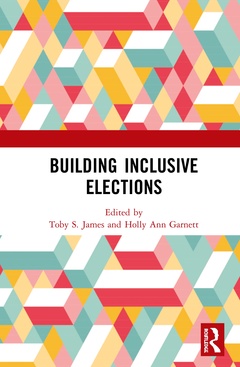Building Inclusive Elections
Coordonnateurs : James Toby S., Garnett Holly Ann

Elections around the world are plagued with the problem of unequal levels of participation. This can have profound consequences for election results, representation and policies. This book focuses on the interventions that can be used to redress the turnout gap and other inequalities within the electoral process.
The book defines the concept of inclusive voting practices to refer to policy instruments which can reduce turnout inequality between groups and mitigate other inequalities within the electoral process. Studies from around the world then examine how policies can affect inclusivity on election day. This includes research on enfranchising felons and migrant communities; compulsory voting; voter ID requirements; voter registration practices; investment in electoral management; gendered electoral violence; accessible voting practices; and overseas voting. As a result, this book will be of interest to scholars of democracy, democratic theory and elections, as well as having major policy implications worldwide.
The chapters in this book were originally published as a special issue of the journal Policy Studies.
1. Introduction: the case for inclusive voting practices
2. Restoring voting rights: evidence that reversing felony disenfranchisement increases political efficacy
3. Are inequalities in representation lower under compulsory voting?
4. Conceptualizing more inclusive elections: violence against women in elections and gendered electoral violence
5. Electoral integrity, voter fraud and voter ID in polling stations: lessons from English local elections
6. Implementing voter ID: lessons from Missouri, USA
7. Waiting to vote: the effect of administrative irregularities at polling locations and voter confidence
8. Disability and election administration in the United States: barriers and improvements
9. Migrant populations and external voting: the politics of suffrage expansion in Central America
10. Inclusive voting practices: lessons for theory, praxis, and the future research agenda
Toby S. James is Professor of Politics and Public Policy at the University of East Anglia, Norwich, UK. He has published widely on electoral integrity, political leadership and the policy process. His books include Elite Statecraft and Election Administration (2012) and Comparative Electoral Management (2020). He is a co-convener of the global Electoral Management Network.
Holly Ann Garnett is Assistant Professor of Political Science at the Royal Military College of Canada and cross-appointed at Queen’s University, in Kingston, Ontario, Canada. Her research examines how electoral integrity can be strengthened throughout the electoral cycle, including electoral management, registration and voting procedures, election technology, civic literacy and campaign finance. She is a co-convener of the global Electoral Management Network.
Date de parution : 01-2024
17.4x24.6 cm
Date de parution : 07-2020
17.4x24.6 cm
Thème de Building Inclusive Elections :
Mots-clés :
Electoral Violence; Compulsory voting; Voter Id; Democratic theory; Voter Identification; Electoral management; External Voting; Overseas voting; Voter Id Requirement; Inclusive voting practices; Electoral Commission; Restoring Voting Rights; Voter Registration Files; CCES; Voter Identification Laws; Turnout Gap; Inclusive Voting; Negative Relationship; Photo Id Requirement; Photo Id; Voting Equipment; El Salva Dor; Extended Wait Times; CSES Data; OLS Regression; UK Electoral 83 Commission; Organizationof American States; Provisional Ballots; Richest Respondents



